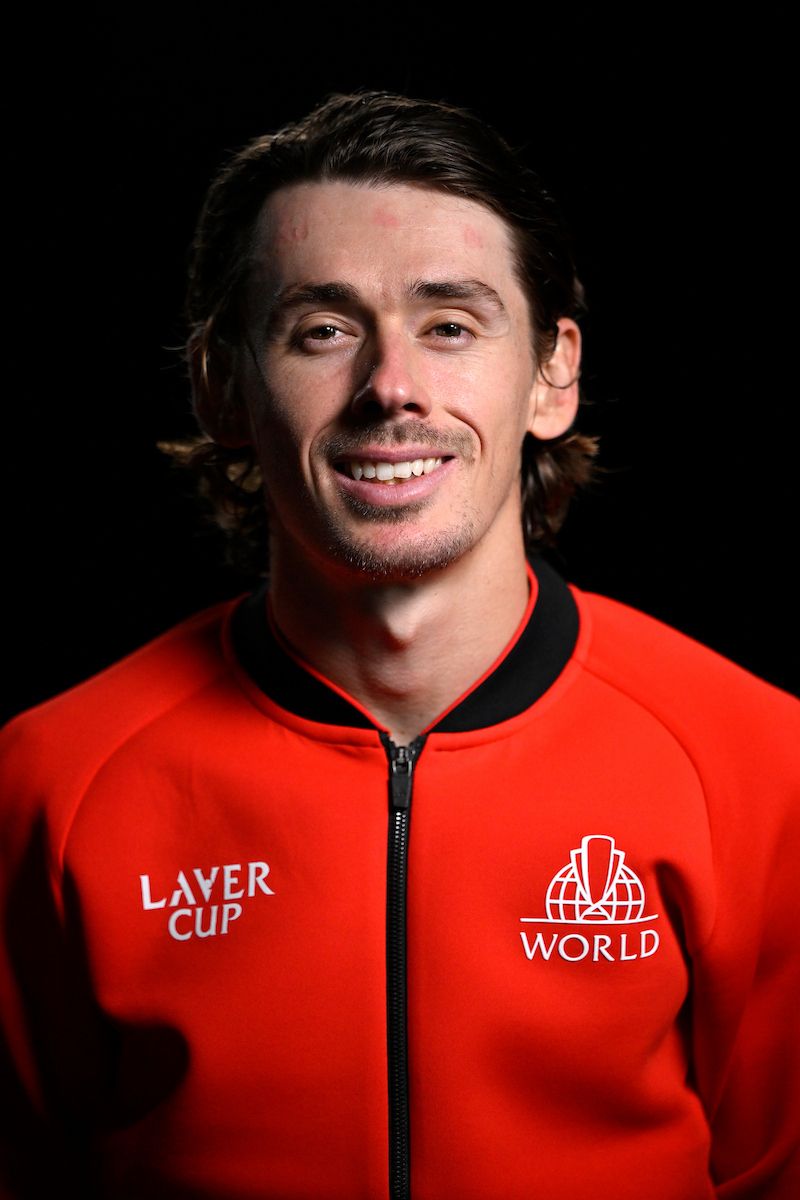Jesse Marsch’s vision for Canada’s soccer future

PISA, ITALY – Two days before the Canadian men’s national soccer team walloped Romania 3-0 early last month, head coach Jesse Marsch convened his players in their Bucharest hotel for a team exercise.Wearing matching black Nike tracksuits, the players were split into four groups and each group was told to choose a teammate who was agile. Those selected – Ismael Kone, Ali Ahmed, Jahkeele Marshall-Rutty, and Zorhan Bassong – were then blindfolded and ushered into a ballroom that had been converted into four identical obstacle courses.The four blindfolded players spent 15 minutes scrambling over furniture and navigating underneath tables, shuffling soccer balls across the room, and manoeuvring in and around plastic discs and cones, dependent on shouted instructions from teammates. Any missteps added to their time.Marsch told me about the exercise a week after the fact, while we were building a bocce court in the shadow of an olive grove outside his home on the outskirts of Pisa, Italy. The 51-year-old coach and I had agreed to spend time together following his team’s 1-0 win over Wales and talk about our upbringings and parenting, our career paths and resilience, and about how Marsch is preparing his players to prepare for next summer’s home World Cup.Standing in the shade of an olive tree, Marsch’s hands shook with laughter as he showed me the two-minute video he filmed of the obstacle course.“Look at this! This is awesome,” Marsch exclaimed. “It’s all about communication. All four teams are doing things parallel to each other, and some teams are shouting, some teams have multiple voices, some guys speaking French. It was a masterpiece of the kind of exercise we needed.”Marsch, who has coached at Leeds United, RB Leipzig, Red Bull Salzburg, New York Red Bulls, and the Montreal Impact (now CF Montreal), said that after the players finished the obstacle courses, the team did a debrief. After the blindfolds came off, his players spoke of disorientation, of not knowing whether they were in a large room or a narrow corridor. The words the players used, Marsch said, were trust, clarity, and efficiency.Marsch said that while his team brims with athletic talent — the Canadian men currently are ranked 26th in the world, up from 49th when he assumed control in May of 2024 — the exercise was a perfect one to illustrate one of Canada’s shortcomings.“Our team is young,” Marsch said. “Our players don’t talk enough to each other on the field and I’m looking for ways to change that, to foster intentional leadership and trust. I want them all to be more assertive on the pitch.”The exercise in Bucharest was one of several tactics Marsch has used to push his players toward becoming more connected and to reflect on their commitment to the national team.During one on-field drill Marsch and his fellow coaches assigned, players were given three phrases they could use to communicate with their teammates depending on whether they were attacking the ball as defenders or on the ball and advancing on their opponents. Each of the phrases were specific to a player’s position. Midfielders, for instance, were told they could scream “Go now!” or “Be on the jump!” to help forwards who were waiting to sprint past the last line of defenders when they might not have a view of the ball.Before their camp in Romania, Marsch sent players video clips from Les Yeux dans les Bleus, a documentary chronicling France’s 1998 World Cup triumph, highlighting the players’ ability to communicate and hold one another accountable — often without their coach’s guidance. Marsch also forwarded players passages from the story of Roger Bannister, who in 1954 became the first man to run a mile in under four minutes.“People had said the four-minute mile was something that never could be done, and then Bannister did it on a damp, blustery day on an old track at Oxford,” Marsch said. “After he did it, 23 others also broke four minutes during the next 18 months. The point is that it shows physical boundaries are often more mental than they are physical.”Marsch has also shared with some players excerpts from the writings of Stanford University psychologist Carol Dweck. Dweck believes that people who think they were born with all of the smarts and physical gifts they will ever have approach life with a “fixed mindset.” Others who believe they can improve their abilities over time have a “growth mindset.”“I love that way of looking at the world,” Marsch said. “True greats analyze their weaknesses and their processes and find ways to get better.”---Over the course of several days at his hillside home, our conversations took place between stretches of manual labour. We shovelled gravel and hammered logs into a frame around the bocce court. It was the kind of tactile, physical work that seemed to fuel Marsch’s restless mind.Later, we drove north toward Turin to watch Canadian striker Jonathan David and Juventus face Inter Milan, then east to Reggio Emilia, where Koné was starting for Sassuolo in a match against Lazio. Along the highway, past marble quarries and low orchards, Marsch laid out his vision for Canada: a program built not on possession and elegance, but on pressing and speed.Marsch recalled that he had introduced himself to his new players during a meeting in Rotterdam, Holland, in June 2024 with a challenge. Too many Canadian players, he told them, were coasting.Marsch said when he was evaluating prospective national-team players in his early days as Canada’s coach, he speculated that some of the players he was considering were 19 or 20. But when he searched their names on the Internet, he discovered they were actually 26 or 27.“I said, ‘Guys, I don’t want to be condescending but it’s time for you to grow up,’” Marsch explained. “I was like, ‘Too many of you play professional football because you like it and you’re good at it, instead of it being in pursuit of excellence.’ I told the players, ‘Too many of you have been playing passive football that will never make you successful on the international stage. And by the way, I’m talking about every single one of you. You all need to grow up.’”Marsch said the players “didn’t bat an eye.” He showed them statistics about the Canadian team’s goals against. He said more than 70 per cent of goals Canada had surrendered during the previous two years – including the 2022 World Cup in Qatar – were tied to mistakes Canada made during their possession phase, when they had the ball and turned it over.Marsch said he explained that Canada could keep playing a possession-based game and improve its international standing, perhaps bolstering their ranking to 35th or even 30th in the world.But then, after taking a beat, Marsch suggested another path.If players were willing to believe in and commit to a pressing system, where they would run all game and pressure their opponents, Marsch said the improvement could be startling. He wondered aloud whether Canada could rise in FIFA’s rankings to 20th or even 15th in the world.“It was funny because then they all kind of looked around at each other,” he said. “I caught some of them smiling. Even Alphonso [Davies] at that point kind of looked around the room with a smile on his face, like, ‘Yeah, we’re f---ing fast.’”“I explained to them, ‘This is what it takes. This is how we’re going to train. Everyone thinks the highest levels of football are about elegance and passing. That’s not it. When you stand on the sideline and you have the best seat in the house, the elegance of the game is not what strikes you. It’s the power and the speed and the dynamism of everything that happens. That’s what the best players have. When something important needs to get done, it gets done at a pace and a power that is an incredible level. Right? It’s not about, ‘Look at that first touch.’”It wasn’t long before Marsch reinforced his off-pitch standards, as well.Following a match in Suriname in November, Marsch said he exploded at Canadian players and staff when, after Canada’s 1-0 win, players began eating cheeseburgers and French fries from a buffet. Marsch said he was upset because his team had progressed to the point that it was finally securing matches and results against soccer powerhouses such as France. The margin for error was narrower than ever and fast food was no recipe for peak performance.“There’s a ‘fun dad’ version of me and a ‘psycho dad’ version, and right there the players and staff saw the psycho dad,” he said. “Some of the young guys had also left garbage all around their lockers for our staff to pick up. I lost it. Everyone learned right there that our minimum standards for how you treat your body and how you act are extremely high.”---Gavin Colquhoun, who played for Princeton University’s hockey team in the early 1990s and met Marsch when they both attended the Ivy League school, said Marsch’s temperament is ideal for coaching young players.“This is a guy who gives to others not to get back, but gives because he wants to help others,” Colquhoun said in an interview. “He has a skill for connecting with these players in a real way. Jesse looks to see the best in people. He wants to trust.”(As Canada’s head coach, Marsch already has allowed several journalists to sit in on his meeting with coaches ahead of matches, a move that is rare in international soccer. He also allowed a reporter to fly on the team’s charter to and from Suriname.)I pressed him about the team he inherited from his predecessor, John Herdman, and about whether he was modelling his Canadian team on any prior World Cup teams.“John did a lot for this program,” Marsch said. “He brought structure. Before him, some guys wouldn’t come to camp with the national team. The travel, the training sessions, hotels, and food were all subpar. John turned Canada into winners. His team had a lethal counterattack but his players were old. They did great and they qualified for Qatar but then John began playing a ‘Pep’ possession game and they struggled.”Pep is Manchester City manager Pep Guardiola, a former Spanish national team player who has won domestic titles at ever club he has managed, with 39 titles in his career including three Champions League wins.Guardiola employs a style of football known as “juego de posicion” (positional play) in which his players avoid aggressive long passes and focus on possession, constantly passing the ball back to open teammates. With the ball controlled by his most creative players, Guardiola believes his team cannot help but eventually score.Marsch instead wants Canada to press and attack opponents with the ball and be ready to counter for fast breaks up the field.“We are one of the fastest teams in the world,” he said. “Before I got here, I had coached six players who could run 37 kilometres an hour. On this team, we have nine.”Marsch said the best model for the Canadians may be South Korea’s entry in the 2002 World Cup. That team, which had never advanced out of the first round and was ranked 40th in the world going into the tournament, was built on speed and attacking. South Korea, which co-hosted that World Cup with Japan, stunned Italy and Spain and advanced to the semifinals before losing to Germany.“I played with the U.S. in late 2001 when we played the Koreans,” Marsch told me. “I remember they were practising on the pitch next to us. As all of the Americans arrived, we were all laughing and jovial, getting our boots on, juggling balls.”As the Americans were greeting one another, Marsch said the Koreans were already sprinting on the field, doing a so-called beep test used to measure an athlete’s maximum oxygen uptake (VO2 max.) Players run 20-metre shuttles in time with progressively faster beeps until they can no longer keep up with the beeps.“By the end of watching them do that drill, none of us were laughing,” Marsch said. “No one was saying a word. We were like, ‘Holy s--t.’ They were dynamic. They crushed us 1-0, but we could have lost 5-0.”Marsch said when he was hired by Canada Soccer, he told organization chief executive and general secretary Kevin Blue that this was the model he wanted to adopt. Blue said Marsch was enthusiastically recommended by former men’s national team players including Atiba Hutchison and Tosaint Ricketts during the search for a new coach.Through the search process, Blue said he repeatedly heard how Marsch approaches life through a lens that extends beyond soccer. Years before he played for 14 seasons in Major League Soccer for DC United, the Chicago Fire, and Chivas USA, Marsch was an All-American at Princeton and wrote a thesis about the state of earthquake preparedness in California.“Jesse is driven, highly intellectual, comfortable in his own skin and determined,” Blue said in an interview. “There’s no doubt in my mind he’s the right type of person to lead our men’s national team program right now because of how suited his coaching style is for the speed and athleticism of our players.”Blue said Marsch is also invested in helping build the sport across Canada.“This guy is eager to engage with donors, help with youth camps, help coach coaches. He’s strongly convicted about making soccer stronger in Canada.”---It’s been 17 months since Marsch was hired and Canadian players seem to have bought into his system of pressing and attacking.Besides putting players through an obstacle course at their hotel Bucharest, Marsch and his coaches also came up with other drills to get players talking more.In one drill, players were asked to interview another player on the team and share what they had learned with the entire team. In another, Marsch split players into teams and gave them 10 seconds to answer questions such as “Who were the finalists last year for the Ballon d’Or [FIFA player of the year trophy]?” and “Which European countries have three borders?”“Each team could only have one player answer, and they have 10 seconds, so you can’t have everyone yelling at once,” Marsch said. “Part of this, remember, is we have to make this fun for the players. They are working with their club teams for 11 and a half months of the year and they basically are using their time off to come to play for us. That’s not something I take for granted.”For a country still learning what it means to compete on soccer’s biggest stage, the image of players guiding one another through the dark feels fitting. Marsch has made it clear to his players that for Canada to thrive, his players must trust him, but, even more important, they need to trust and communicate with each other.









